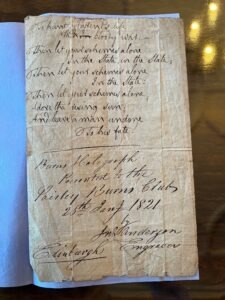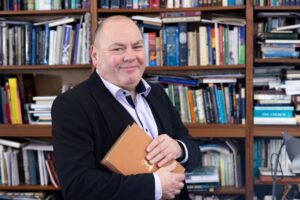University of Glasgow scholar discovers hidden Burns manuscript

Page 1 of the cancelled manuscript of Ye Jacobites by Name in the handwriting of Robert Burns was discovered in the collection of Burns' materials held at Barnbougle Castle, near Edinburgh
In a discovery, a leading expert at the University of Glasgow has uncovered a previously unknown manuscript by the renowned 18th century Scottish poet Robert Burns.
In a press statement, the university says that the cancelled working manuscript, an early version of one of Burns’ most famous songs, Ye Jacobites by Name, sheds new light on his revolutionary inclinations during the tumultuous period of the French Revolution.
The statement adds that the cancelled working manuscript, dating back to 1791 during the inflammatory early days of the French Revolution, showcases Burns’ implicit sympathy for radical reformers challenging the limited democracy of 1700s Britain. Burns, who worked as a highly-skilled Exciseman, lived a life devoid of political voting rights. The cancelled draught, titled Ye Black-nebs by Name, sheds light on Burns’ support for reformers advocating political change during a period when agitation for such change was on the rise in the British Isles.

Page 2 of the cancelled manuscript of Ye Jacobites
The statement adds that the revelation provides a glimpse into Burns’ willingness to risk professional consequences, including potential dismissal from Crown service, as he expressed solidarity with those challenging the status quo of limited democracy that favoured a small propertied class. The Bard’s birthday celebration gains added significance with this newfound insight into his bold stance during a pivotal period in history, says the university.
“In discovery within the collection of Burns materials held at Barnbougle Castle, near Edinburgh, gives a fascinating insight into Burns creative genius he used a simple formula to hide his political thinking in plain sight, seeming to write about the past but signalling the present. ‘Black-nebs’, a term for reformers in the 1790s, disappears altogether in the cancelled manuscript as this is supplanted by the final version of Ye Jacobites by Name. We only know that by Jacobites he was perhaps actually thinking of contemporary reformers once we are aware of the existence of the cancelled document, now rediscovered,” says Professor Gerard Carruthers, Francis Hutcheson Chair of Scottish Literature.
“The cancelled ‘Ye Black-nebs’ chimes with other songs, most famously ‘Scots Wha Hae’ and A Man’s a Man for a’ That’ where revolutionary ideas are smuggled in under the guise of writing about the Scottish Wars of Independence or universal brotherhood. In the end, ‘Ye Black-nebs’ was more explicit than these texts and is completely overwritten by ‘Jacobite’. Burns’s original version, however, raises the strong possibility that the finished version is code for more recent 1790s revolutionaries,” he adds.
“The variant ‘Black-nebs’ [revolutionaries] instead of ‘Jacobites’ in the Barnbougle manuscripts references someone of democratic principles following the French Revolution and raises the intriguing proposition that Burns thought first of composing a lyric in the voice of a disillusioned radical of 1790s before moving from a Jacobin-themed to a Jacobite’ one,” adds Carruthers.
“If Burns had lived longer, I believe he would have been in favour of political reforms emerging at that time particularly after the Napoleonic wars of the early 1800s. He wouldn’t have continued to use cunning to cover his allegiances I don’t think. But at the time as a Crown employee and at this point in his life, he hadn’t got there just yet. But I believe he would have increasingly been on the side of democratic reform had he lived into the early 19th century,” says the scholar.
“However, when this was written Ellisland, his farm, was not as productive as he would have liked, and things were uncertain financially for him and his growing family. He was therefore dependant on his Excise employment and couldn’t speak as freely as he might have liked. It was a very dangerous time for people who backed political reform in the wake of the American and French revolutions. For example, Thomas Muir, a famous Scottish political reformer, fewer than two years later in 1793 [when ‘Ye Jacobites by Name’ was first published] was transported to Botany Bay with a sentence of fourteen years after having been found guilty of sedition due to the speeches he had given on the ideals of democracy,” Carruthers adds.










